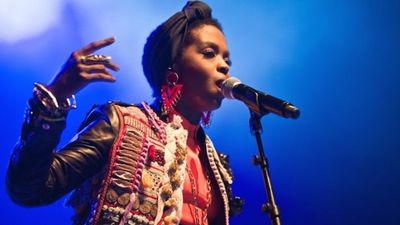Lauryn Hill In North Africa: An Inspiration For Resistance
Examining Lauryn Hill's influence on North African revolutionary hip-hop groups and female Tunisian & Egyptian MCs.
'Wake up and rebel, We must destroy in order to rebuild…Oh are you satisfied?, Rebel… Ohhh rebel'
Lauryn Hill, "I Find it Hard to Say (Rebel)"
Last month, multi-award winning R&B and hip-hop artist Lauryn Hill graced the stage at the 51st Carthage Festival in Tunisia. After a late start, Hill impressed the audience by performing some of her biggest hits and renditions of songs by Bob Marley, a revered revolutionary icon in Tunisia. In fact, Hill's music is admired throughout the region for its revolutionary message and support for the struggles of oppressed people.
The Tunisian Revolution of 2010-11 was sparked by the self-immolation of street vendor Mohammed Bouazizi after harassment and humiliation by police. The uprising began what came to be known as the 'Arab Spring.' Hip-hop music also played a pivotal role in the revolution with the scathing political track "Head of State" by rapper El Général (Hamada Ben Amor) quickly becoming the unofficial soundtrack. The artist was detained after protests began to surge, however the political rap anthem had already inspired Tunisian youth to continue their struggle to oust the unpopular president Ben Ali.
Arabian Knightz "Rebel"
The violence and oppression from seventy years of French colonial rule remains a considerable part of Tunisia's collective memory. And after experiencing war, internal conflicts, and enduring decades of authoritarian rule, many Tunisians feel a strong bond with the African American struggle. Hill's music is particularly appealing to Tunisian youth because it presents penetrating and personal social commentary.
Her lyrics also reflect her diverse religious influences which include Rastafarianism, the Ethiopian Orthodox Church, Protestant Christianity, the Five-Percent Nation and Islam. MCs, producers, DJs, graffiti artists and b-boys/b-girls are admired in Muslim majority countries so the popularity of a black U.S. cultural icon like Lauryn Hill – one with an anti-establishment position and unconventional religious views – is not unusual. In 2004, the multi-talented and influential RZA (from Wu Tang Clan) toured Egypt, Albania and Turkey accompanied by Moroccan-Dutch rappers Cilvaringz and Salah Edin.
Rap and Resistance
African American music, culture and politics has played a pivotal role in the political aspirations and cultural developments of recent youth movements in North Africa and their diasporas. In 2011, as the Egyptian Revolution was gathering momentum, the Egyptian hip-hop sensation Arabian Knightz uploaded a music video for their track "Rebel" in which they sample Lauryn Hill's "I Find It Hard To Say (Rebel)."
Both the Tunisian and the Egyptian Revolutions were incited by police brutality. Egyptians rose up against President Mubarak in 2011 after twenty eight year old Khaled Said was beaten and died in police custody in Alexandria. Lauryn Hill's "I Find It Hard To Say (Rebel)" was dedicated to twenty two year old Amadou Diallo, an immigrant from Guinea, who was shot and killed by four New York City police officers in 1999.
In 2014 Hill dedicated a new version of her confrontational song "Black Rage" to the protesters in Ferguson, after the police shooting of black teenager Michael Brown thousands across the US rallied to express anger and frustration over continuing discrimination and police brutality against African Americans.
Like in the U.S., young people in Tunisia and Egypt are drawn to hip-hop because the genre resonates with those who experience oppression and discrimination, particularly at the hands of the state. Lauryn Hill's appeal in North Africa is not surprising considering the impact of hip-hop culture and its capacity for unifying marginalized and stigmatised people. Following Lauryn Hill's performance, the Carthage Festival showcased some of Tunisia's talent with socially conscious hip-hop artists such as Balti and Kafon taking the stage. Both rappers have been arrested in the past and their music is explicitly political.
Mayam Mahmoud "myam_انا مش سيجارة"
Hip-hop, social media, digital technology and diaspora communities intersected and impacted the uprisings in Tunisia and Egypt. Political reform and progressive cultural and religious interpretation feature prominently in hip-hop from North Africa; inter-faith and inter-cultural collaboration are common and female artists also have active roles in the movement. Female rappers Yukka (Egypt), Mayam Mahmoud (Egypt), Madusa (Tunisia) and trip-hop musician Emel Mathlouthi (Tunisia-France) have been at the forefront of transnational collaborations.
Empowering Tunisia and Egypt's hip-hop communities has unlimited potential. North African rappers are diverse, globally connected and have proven that they are willing to risk everything to express themselves and contribute to positive change. Their music can foster constructive transnational ties and social transformation.
Dr. Omid Tofighian is a ARC Research Assistant and Honorary Research Associate in the Dept. of Philosophy at The University of Sydney. He can be contacted via e-mail.
A poster promoting Lauryn Hill at the Festival de Carthage 2015.
- This Nigerian MC Is The Queen Of Freestyles - OkayAfrica ›
- Nadia Nakai Explains Why She Never Used to Work With Women ... ›
- 2018 Was the Year Women Won In (South African) Hip-Hop ... ›
- Issa Rae's New Show 'Rap Sh*t' Is Set to Premiere on HBO Max ... ›
- Women In South African Hip-Hop: 6 Leading Female Rappers ... ›
- Abo Sahar On His Own Blend of Egyptian Electronic Music - OkayAfrica ›
- Norfafrica Shares the Sounds of a Region on the Rise - Okayplayer ›
- Copy of The Youth-Led Protests that Continue to Reverberate Across Africa | OkayAfrica ›
- The Youth-Led Protests that Continue to Reverberate Across Africa | OkayAfrica ›
